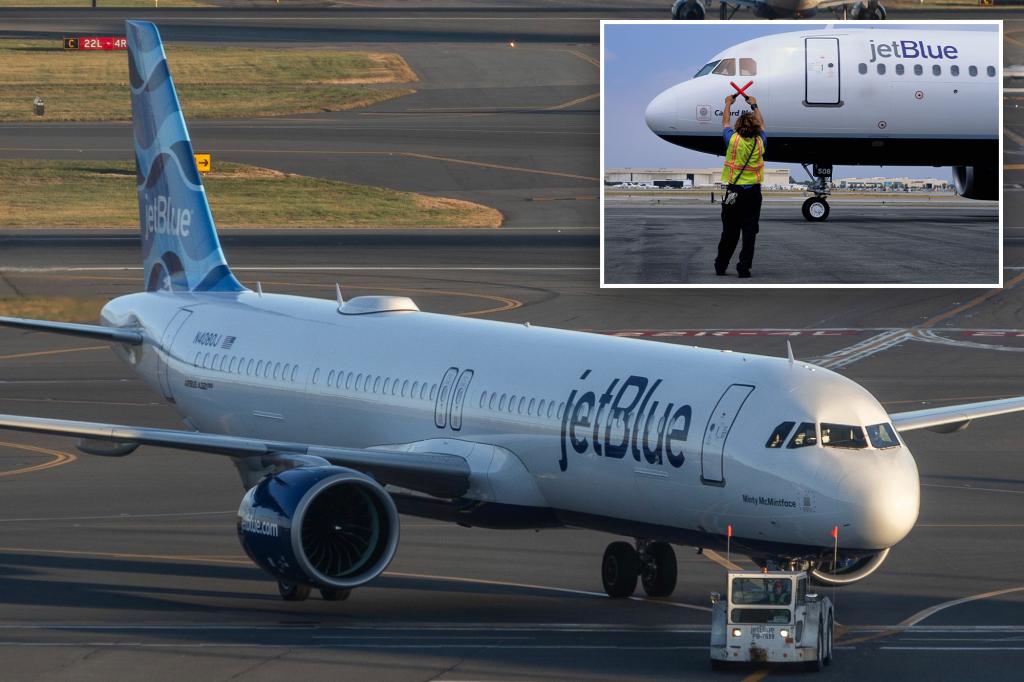Incident 1: Unauthorized Deployment of Emergency Slide at Logan Airport
On Tuesday evening, a disruptive incident unfolded at Boston Logan International Airport involving a JetBlue flight preparing for departure. As the aircraft taxied towards the runway, a male passenger, for reasons yet unknown, managed to open an overwing emergency exit. This action triggered the automatic deployment of the aircraft’s inflatable emergency slide, designed for rapid evacuation in emergency situations. Although a startling and disruptive event, thankfully, no injuries were reported among the passengers or crew. Massachusetts State Police swiftly responded to the scene and detained the individual responsible. JetBlue confirmed the incident, stating they were working diligently to minimize disruption to other passengers and expedite their onward journeys. While the exact motive behind the passenger’s actions remains unclear, the incident underscores the importance of robust security measures and passenger compliance with safety regulations within the aviation industry.
The incident caused a significant delay for the flight, impacting the travel plans of numerous passengers. The unauthorized deployment of the emergency slide necessitated its replacement and a thorough inspection of the aircraft to ensure its airworthiness. This process inevitably caused a ripple effect, leading to rescheduling and logistical adjustments for both the affected flight and subsequent operations at the airport. The disruption underscores the vulnerability of air travel to unforeseen events and the importance of contingency planning by airlines to mitigate the impact on passengers and operations.
Incident 2: Discovery of Deceased Individuals in Aircraft Landing Gear
Earlier in the week, a separate and profoundly more tragic incident involving a JetBlue aircraft came to light. During routine maintenance checks on a JetBlue flight arriving at Fort Lauderdale-Hollywood International Airport from New York’s John F. Kennedy International Airport, two deceased individuals were discovered within the aircraft’s landing gear compartment. The grim discovery prompted an immediate investigation by authorities to determine the circumstances surrounding this tragic event.
The discovery of the bodies within the landing gear compartment raises numerous questions about security protocols and the potential for individuals to gain unauthorized access to restricted areas of airports. The investigation will likely focus on establishing the identities of the deceased, their point of entry into the landing gear compartment, and the timeframe of their presence. Understanding these factors is crucial for assessing potential security vulnerabilities and implementing measures to prevent similar incidents in the future. The investigation will also aim to determine the cause of death and whether any foul play was involved.
JetBlue expressed profound sadness and pledged full cooperation with the authorities in their investigation. The incident serves as a stark reminder of the complex and often unpredictable nature of events within the aviation industry and the importance of continuous review and enhancement of safety and security measures.
The Broader Context: Aviation Security and Passenger Behavior
These two incidents, though distinct in nature, highlight the multifaceted challenges faced by the aviation industry in ensuring both the safety and security of air travel. The unauthorized deployment of the emergency slide underscores the potential for disruptive passenger behavior to impact flight operations and the safety of those onboard. While security measures are in place to screen passengers and prevent unauthorized items from being brought onto aircraft, the incident at Logan Airport highlights the potential for unpredictable human actions to circumvent these measures.
The discovery of the deceased individuals in the landing gear compartment raises separate concerns related to airport security and the potential for individuals to breach restricted areas. This incident exposes the vulnerability of aircraft to unauthorized access, particularly during ground operations. A thorough investigation is crucial to understanding how such a breach occurred and to identifying any weaknesses in existing security protocols. The findings will be crucial in informing future security enhancements and preventing similar incidents.
Impact on the Aviation Industry and Passenger Experience
These incidents, though unrelated, have the potential to contribute to a sense of unease among air travelers. The unauthorized deployment of the emergency slide, while not causing physical harm, could heighten anxieties about disruptive passengers and the potential for in-flight emergencies. The discovery of the deceased individuals in the landing gear compartment, while a rare occurrence, may raise concerns about the overall security of aircraft and airports.
The aviation industry is constantly striving to balance the need for robust security measures with the desire for a smooth and efficient passenger experience. These incidents underscore the delicate nature of this balance and the need for continuous review and adaptation of security protocols to address evolving threats and vulnerabilities.
Moving Forward: Lessons Learned and Future Considerations
The incidents involving JetBlue this week serve as valuable case studies for the aviation industry, highlighting areas where security measures and passenger management protocols can be strengthened. The incident at Logan Airport underscores the importance of clear communication with passengers regarding safety procedures and the consequences of disruptive behavior. Enhanced training for cabin crew in managing disruptive passengers and de-escalating potentially volatile situations may also be beneficial.
The discovery of the deceased individuals in the landing gear compartment necessitates a thorough review of airport security procedures, particularly those related to access control in restricted areas. Enhanced surveillance, perimeter security, and stricter enforcement of access protocols may be necessary to prevent similar breaches in the future.
These incidents also highlight the importance of information sharing and collaboration between airlines, airport authorities, and law enforcement agencies. By working together to analyze these incidents and identify areas for improvement, the aviation industry can enhance its collective ability to ensure the safety and security of air travel for all.

